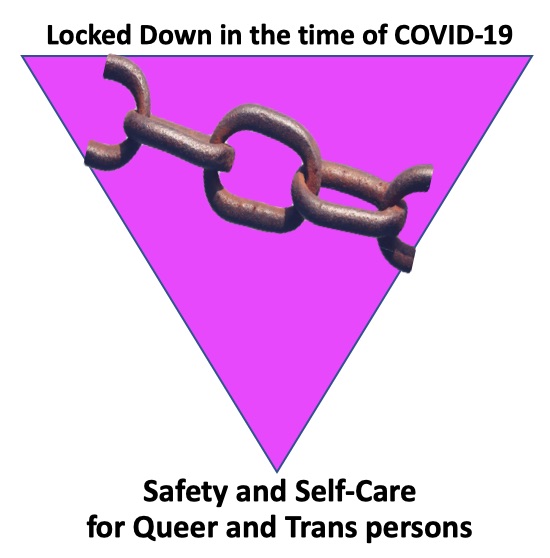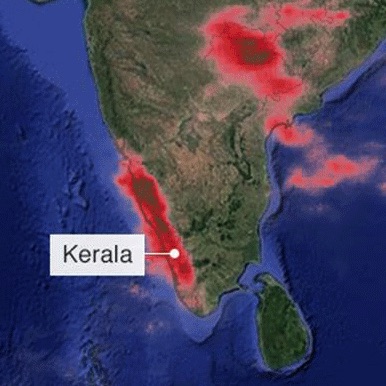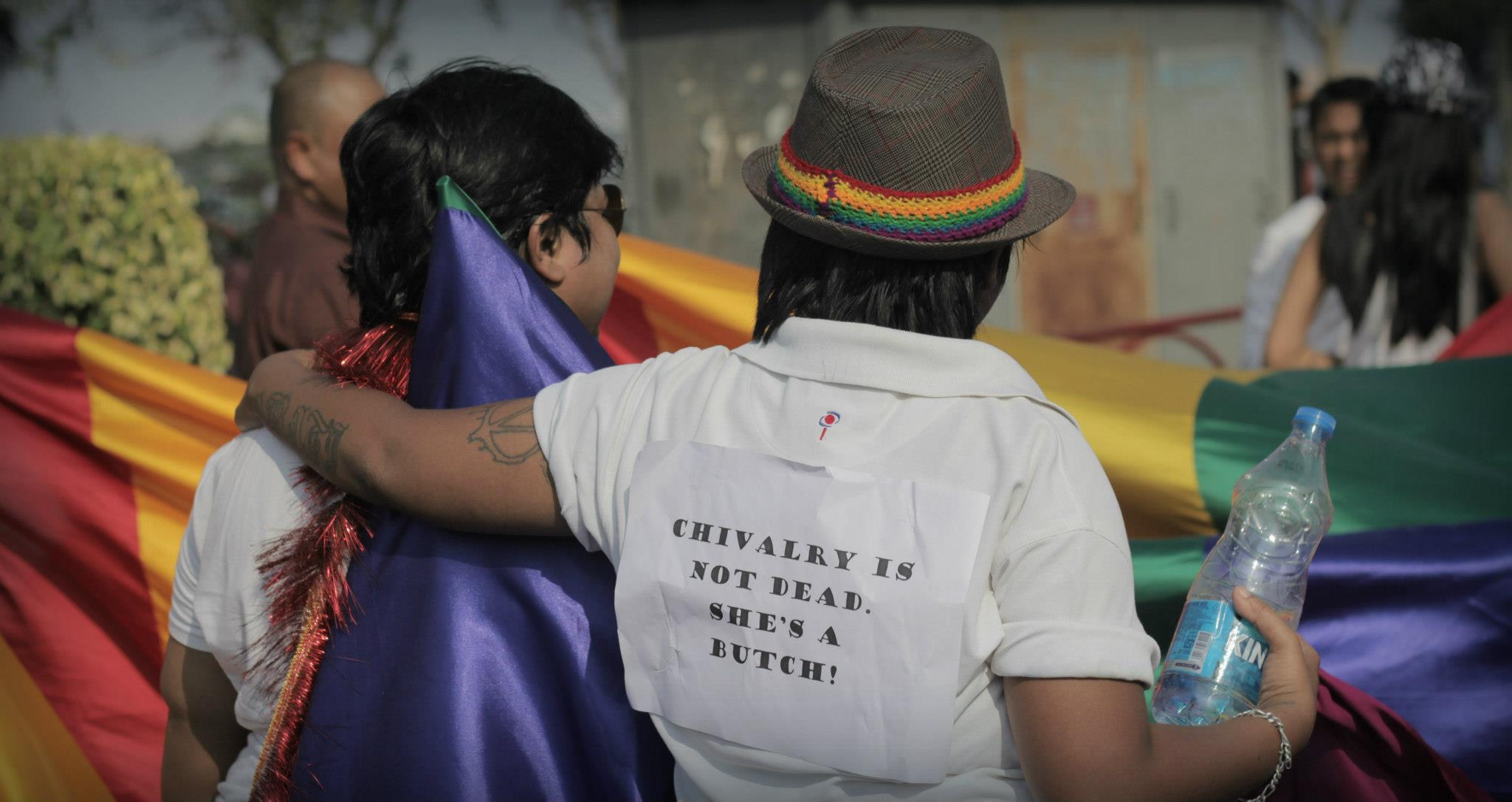Supreme Court hearings on Naz: Feb 23 2012
So much tamasha has happened in the media about the case today that its almost easy to forget that arguments were going on in court. In fact, the part that stands out today is the extent to which what was happening in court was divorced from what people, egged on by the media, thought was happening in court.
Trying to understand purely from these minutes which were received from our sources in court – to who the credit for taking them down and writing them up in a few hours must really go, while Iam just doing postal duties – I am guessing that when the Bench unexpectedly asked Mr.Malhotra for the government’ss response, Mr.Malhotra might have been caught short since as far as we know, the government wasn’t planning on intervening in this case.
But since Mr.Malhotra had been one of the opposing counsel in the Delhi High Court case he could happily trot out his arguments from there, and this is what you are hearing more than 20 years later. The fact that his arguments are outdated and often contradictory doesn’t seem to stop him saying them. Since then the Naz judgment has taken place, Pride marches have happened, gay businesses and parties have come up and more and more people are coming out but Mr.Malhotra has not changed his arguments.
As we now know, his remarks were disowned by the Ministry of Home Affairs (MHA) which leaves a lot of what happened today in limbo. The next hearing will be next Tuesday and we will get a sense then then if the Bench will ask for more information, if it will stand by Mr,Malhotra, despite the MHA not backing him, if it will ask for more actual cases and so on.
But while all this was going on in court, the media outside went into a frenzy, which panicked a lot of people in the community, many of who put the news on FB and twitter, further spreading the news;. All this can’t really be stopped entirely, but it does show how fast information and misinformation can spread. Again, as I said earlier, this puts a special responsibility on everyone who uses social media a lot to be careful what they put up.
Notes for 23.02.12- Naz Foundation case in Supreme Court Bench- Justice Singhvi and Justice Mukopadhyay
Mr. Sharan continued his arguments. The judges asked Mr Sharan how many countries had laws like 377. He said that there were 76 countries of which 7 were punishable with death. The Bench said that it was up to their legislatures to decide. Mr Sharan then argued that the right to privacy was not absolute, and that for the right to privacy to be invoked there must be a violation by a
statute that was direct, and not remote. He said that section 377 was not intended to invade privacy, and did not breach privacy directly. He argued that neither the dignity nor privacy of the individual was affected by the provision, and therefore a challenge under Art 21 would fail.
Mr. Sharan argued that there was a presumption of the constitutionality of the law, and that Indian case law had held that it was open to a legislature to make laws directed against a class. If the classification is intelligible and there is a nexus between the object of the law and classification, then that classification has been upheld, he said.
Mr.Sharan argued that there was no class targeted by 377, that no classification had been made, and therefore the finding of the High Court that this law offended Art 14 as it targets a particular community known as homosexuals or gays was without any basis. He argued that there was no empirical data to show that there is a homosexual community and that there was nothing to show that they constitute a class.
The Bench asked if there was any material placed by the petitioners before the High Court. Mr.Sharan said that there was statement placed before the court that there were 25 lakh MSM persons in India but no evidence to show this
“Why do we talk of community? There is no commune. They are part of a general community. The only difference is that the sexual preference of particular individuals is different. They are part of society”, said the Bench.
The Bench said, “There was a peculiar incident in Punjab. Three ladies were frequent pickpockets. One Robin Hood SP got hold of them and got the persons engraved with tattoos on their forehead to mark them as pickpockets. They had to move in society with all that engraved on their foreheads. The courts then found a solution through plastic surgery”
“Except one solitary case of harassment under 377 there is no other evidence”, said Mr.Sharan.
“It is quite possible that some people in society could harass these people. e.g in Mangalore. Two years ago, there was an incident on Valentine’™s Day”, said Justice Singhvi.
Mr Sharan said, “There is no group, no community ..”
“It is individual behaviour. Different persons in society may be varying”, said the Bench.
“The basic substance of the argument is that there is a community of homosexuals and the law targets them”, said Mr.Sharan.
Referring to the High Court’s ruling on Article 15 of the Constitution, Mr.Sharan said,”The judges have a great penchant for citing foreign judgments, using foreign examples, and foreign concepts when there is already a huge mass of case law available on every issue in our country”. Referring to a 1973 Supreme Court decision, Mr.Sharan quoted the court saying that there was already a large volume of material on capital punishment in the west, and that
the court had grave doubts as to the valency of the western experience in our country where the social conditions are different.
Mr.Sharan argued that there was nothing to show that the law offended Art 15(2) of the Constitution. He said that there were no cases before the court with respect to access to public space. He said that there was no general problem that persons of certain sexual orientation should not enter a cinema hall or any public space.
“Article 15(2), My Lord, has been re-written by the Honarable High Court”, said Mr.Sharan.
“The Honorable High Court feels that Art 15 which bans discrimination based on sex includes a ban on discrimination based on sexual orientation. That would my lord, be a case of rewriting the constitution. The words expressly used in Article 15 is confined to gender”, said Mr.Sharan.
Mr.Sharan cited D.D.Basu, an Indian jurist, to say that the Indian Constitution specifically bans discrimination on the basis of sex.˜The fact that Art 15(3) mentions that special provisions can be made in favour of women, means that the provision is restricted to gender and not to sexual orientation” he said.
Mr.Sharan argued that the right to privacy was not uncontrolled and to say that it was absolute as far as consenting acts between adults were concerned was completely fallacious.
Mr.Sharan argued that the High Court mentions constitutional morality as opposed to public morality. He said the High Court was not correct and that there was a curb on morality in Arts 19(2), 25(1) and 26. He cited a 1998 Supreme Court judgment that said that the right to privacy could be curtailed on moral grounds.
“I have made my submissions on legal grounds and my learned friends here will take on other issues”, said Mr.Sharan referring to the lawyers for the other petitioners.
The Bench then asked the Additional Solicitor General P.P.Malhotra, representing the Union Home Ministry to begin his submissions.
Mr.Sharma, counsel for Mr.B.P. Singhal interjected saying he represented one of the parties in the High Court. He said his arguments were not religious, and that he had done research on every aspect of the term “order of nature”.
Mr.P.P.Malhotra, Additional Solicitor General, representing the Union Home Ministry began his arguments. He guided the judges through large parts of the Delhi High Court’s judgment – paras 11, 12, 13 and 14. He read from the Ministry of Home’s affidavit filed in the High Court where the Home Ministry had opposed the decriminalization of homosexuality as it would open the
floodgates of delinquent behaviour. The Home Ministry had then argued that 377 was needed as there was a lacuna in the rape law, and that the section was used to address the abuse of children.
Mr.Malhotra referred to the 42nd Law Commission Report that had recommended retaining s.377 on the basis that societal disapproval was strong enough to retain the law.
“The High Court relied on South African law where moral values and culture are different and the constitution is different”, said Mr.Malhotra
“Who will ultimately decide what is moral and immoral?”, asked the Bench.
“The court will”, replied Mr Malhotra .
“No” said the Bench.
“Why has the legislature not considered this as yet?”, asked the Bench.
“The Law Commission has said don’t decriminalize. How can one tolerate this? It is highly immoral”, said Mr.Malhotra.
“What is immoral?” asked the Bench.
Mr.Malhotra said,”Nature has made man and woman. His penis can be inserted into female organ because it is constructed for that. It is natural. Now if it is put in the back of a man where human waste goes out, the chances of spreading disease is high. There are UN studies to show this” he said.
Mr.Malhotra began talking about how the public in the U.S. and U.K. had shown increasing tolerance to this new sexual behaviour.
“Laws of other countries may not be of great help. If we start making research on that count, there will be some countries that have and some that don’t”, said the Bench.
“Is there a part of the country where this is not applicable?” asked the Bench.
“What about J&K, they have a separate code and the section has not been declared ultra vires by the Delhi High Court.”
But the Bench went on to say it was best to come to arguments and that Mr.Sharan had read the judgment in great detail yesterday. “If every lawyer does that, we will remember every line of
the judgment,” said the Bench.
Mr.Malhotra talked of statistics related to HIV prevalence among MSM populations.
“How many persons are suffering from HIV/AIDS in the country and how many of them are MSM?” asked the Bench.
“HIV prevalence among the general population is less than 1% while among MSMs it is 6 %,” said Mr.Malhotra
“This was stated in 2005. What is the position today?” asked the Bench. Doing a rough calculation the Bench said they were talking of a much larger figure of non-homosexuals suffering from HIV/AIDS.
“I will show that HIV/AIDS is the cause of homosexuality,” said Mr Malhotra.
“That is not necessary. Ask your department to collect appropriate figures. HIV/AIDS may have nothing to do with homosexuality,” said the Bench.
“Why call it MSM? Why not transgenders? If you go for a particular act, that is with transgenders also. Why confine particular acts to MSM? What you are saying is not limited to a class of persons. Why should take figures of MSM only?” asked the Bench.
“Who goes and complains? Find out from appropriate sources how many female children become victims of HIV/AIDS because of sexual abuse. This has nothing to do with homosexuality. Andhra Pradesh, Karnataka and Maharashtra are states where you will find children suffering from HIV/AIDS. This has nothing to do with homosexuality, transgenderism and lesbianism. They are simply victims of sexual abuse by monsters in the form of humans”, said the Bench.
“The modus operandi is that one girl is sold by the family because of poverty, and suffers
from sexual abuse. She is brainwashed and sent to the village where it will attract others who see her as relatively affluent. Human trafficking is the main source of HIV/AIDS, yet the affidavit places much emphasis on 8 % of MSM.”
Mr.Malhotra then proceeded to read from his written arguments. He emphasized that the Delhi High Court should not have relied so heavily on foreign judgments. Referring to a U.S. judgment that the court had cited, He said,”U.S. society is different. Children at 13 and 14, even girls, leave their homes.”
“I have counted at least 31 foreign judgments that the High Court cites,” said Mr.Malhotra.
Mr.Malhotra continued to read from his written submissions.
“Mr. Malhotra, by the way, nothing to do with the case, but do you know any person who is homosexual,”asked the Bench.
“Nobody my lord,” replied Mr.Malhotra.
“They are avoiding our court,” joked the Bench.”You don’t know anybody?”
“I must confess my ignorance about modern society,” said Mr Malhotra.
“We appreciate your ignorance,” joked the Bench.
“Those arguing think they belong to a particular class. There is no classification as such,” said the Bench.
“Every society has a different way of life, different standards, different thoughts. In our society this is not proper. This kind of conduct in the open is not permissible”, said Mr.Malhotra.
“Nobody has said that it cannot be in the open,” said the Bench.
“Who is aggrieved?,” asked Mr.Malhotra. “Ordinarily, all sexual acts are done in private and with consent. We are proceeding on hypothesis and assumption. If you do it in public, even if they are married, they may face prosecution under other provisions, even if they are adults and consulting.”
“I don’t know why this petition was filed at all,” said Mr.Malhotra.
“To give you an opportunity to argue the case,” joked the Bench.
“The issue of sex in Indian society has so far remained a private matter,” said the Bench.
“For the last two days the arguments have gone on in public, and we have seen that the temperature has also gone up,” joked the Bench.
Mr.Malhotra argued that global trends were irrelevant. They are adopting a story of sexual orientation that is not relevant, he said.
Referring to the Home Ministry’s affidavit in the High Court, Mr Malhotrasaid, “If one of them is suffering, the recipient is the person who is doing it, it will be transmitted to another. That is the question of public health. MSM are high risk groups, if this is legalized it will lead to a public health issue,” he said.
Mr.Malhotra argued that the High Court’s reading of the NACO affidavit was completely wrong. “Where is the fear of law enforcement?” he asked
Mr.Malhotra argued that unprotected anal sex among MSM was a significant factor of HIV/AIDS transmission.
Referring to the argument of police harassment leading to obstructing HIV/AIDS prevention efforts, Mr.Malhotra said, “Hardship is no ground to invalidate a law. Law cannot please everybody. Referring to the High Court’s ruling that popular morality or public disapproval not being a ground for criminalization, Mr.Malhotra said, “Law is based on what popular morality says. What is the view of the public, the legislature decided,” he said.
Mr.Malhotra referred to the 172nd Law Commission report which had recommended sections 375 and 376 (rape) had been changed to gender neutral laws. “The Delhi High Court does not say this. The court half reads the report,” said Mr.Malhotra
The Bench said that sections 375, 376, 376A referred to different provisions on consent. “Who has decided that with or without consent in the provision?. Now we have to read ˜without consent and adult man/adult woman into 377,” he said. “Post the High Court judgment we have to read the section in that fashion,” he said.
“Who can do this rewriting? The power lies with Parliament”, said the Bench.
Mr.Malhotra referred to the para 125 of the Naz judgment in which the High Court explains the role of the judiciary and the rationale behind intervening to read down the law.
“The court has reiterated what is known,” said the Bench. “At times the court does this.”
The Bench referred to the High Court’s distinction between constitutional morality and public morality. “Public morality is based on which morality? Constitutional morality or public morality? Is there any penal code or civil code based on constitutional morality? Does the Penal Code reflect some kind of public morality or not? Does it have a nexus with morality or not? Is there a nexus with vices or not? Has that been discussed or not? Is there a nexus
between offences in the IPC and morality in society? Otherwise an act will not become an offence” said the Bench.
Justice Singhvi asked who enacted the IPC. “You need to see when the government of the British took over power from the Company. The first act with respect to Indian territory, did it look into the morality of India or the British?”
“We continued it,” said Mr.Malhotra.
“In the context of public morality we are asking you if the law was enacted by British Parliament or a confederation of states..which morality?” asked the Bench.
“Did they move towards the position of India or towards the British public for enacting the IPC? Was there a code to punish foreigners and excepting locals? Those are questions for the purpose of looking at if public morality was there or not there,” said the Bench.
“Article 372 and Article 13 if attracted, that portion is void, otherwise the provision continues. Any provision violative of fundamental rights would be void”, said the Bench.
“One will have to come back to Article 21,” said Mr.Malhotra.
“After the enactment of the Constitution in 1950, law that is pre constitutional can be declared void. Would it be void or not? Can there be a reading clause or savings clause,” asked the Bench.
“The law has been on the stature book from 1950 to 2012. More than 60 years later now at this stage a long period of time. Society has felt that this law should be there. Government has changed” said Mr.Malhotra.
“The government changing is not relevant. The Parliament has to frame the law,” said the Bench.
“Parliament has not thought it fit to change the law,” said Mr.Malhotra.
“The 172nd Law Commission Report was in 2000. The report is available with you. The Parliament from 2000-2009 did not consider it proper to make amendments to sections 375, 376 and to delete 377,” said the Bench.
“There is nothing like a presumption that Parliament has not applied its mind to the 172nd Law Commission Report. Parliament functions in many ways that we do not know. Reports are considered by committees and debates take place. It is not easy to say that Parliament did not have the time to take time to take this up.”
“Can a court of law take into consideration these reports not accepted by Parliament to decide constitutionality?” asked the Bench.
The Bench asked “Does a law depend on a particular nature of a disease? Different types of infection will come. One today, one tomorrow. How does disease have a nexus to whether law is ultra vires or not?”
Mr.Malhotra handed over his written submissions.
“We would be more enlightened if you can give statistics carried out by the government or government appointed institutions. The rest are theoretical debates,” said the Bench.
Mr.Malhotra read out figures for various states in India of HIV prevalence among MSM community. He said that unprotected anal sex was the most important risk factor for the spread of HIV .
The Bench said, “We are not at all called upon to decide how AIDS or HIV spreads.”
“Only to show homosexuality is a major cause,” said Mr.Malhotra.
“We want to know about India”, said the Bench. “Out of the surveyed men, what percentage were surveyed? These reports are difficult to rely upon like when a survey is conducted in the metros. When a survey is carried by a TV channel, people believe this. Is there a survey conducted in all parts of the country? Do you know how many people suffer from HIV without testing. What about persons who may not have gone to hospitals? The effect of infection may start 12 years later.”
Mr.Malhotra read out figures of HIV/AIDS prevalence among the MSM community for various states in the country.
“For what purpose are you producing these figures? Are we doing research on
HIV?” asked the Bench.
“I am only saying it is one of the modes of transmission” said Mr.Malhotra.
“One of the recognised modes is simple intercourse. If one person is infected, the other person may or may not get it,” said the Bench.
“MSM try different partners, so more chances of transmission,” said Mr.Malhotra.
“HIV is transmitted because of injection, through pregnancy and sexual intercourse. Why MSM?” asked the Bench
“The petitioner claims that they are at risk. This is in response to their petition.”, said Mr.Malhotra.
Mr.Malhotra mentioned a 7 judge bench Supreme Court decision (MP Sharma v Satish Chandra). He said the power of search and seizure and the discussion on the right to privacy was analogous to the 4th Amendment in the USA and there was no justification to import it into Indian Law.
Referring to the Kharak Singh case, Mr.Malhotra said 377 was different from the UP Regulation that was struck down in the case. He said that the right to privacy is not a fundamental right granted expressly under Art 21.
Mr.Malhotra referred to the Gobind v State of MP case to say that fundamental rights can always be subject to restrictions. “Nobody’s privacy is being disturbed. Whose privacy is being disturbed?”, asked Mr.Malhotra.
The judges then referred to para 22 of the Gobind case. “What about the privacy-dignity claim, which can be denied only when a countervailing interest is shown to be superior”, asked the Bench. The judges pointed out that Gobind refers to a “compelling state interest” that has to be satisfied to curb fundamental rights on the basis of morality. They asked if the enforcement of morality was sufficient to deny fundamental rights.
“The test related to the fundamental right to privacy is that of compelling and permissible state interest. Show us that this test is satisfied,” said the Bench.
Mr.Malhotra referred to the case of Sharada v Dharampal to say that Art 21 could not be treated as an absolute right.
“You can’t say that the right to privacy is not absolute”, said the Bench.
“Can you highlight us on the morality and state interest test.”
Mr.Malhotra then referred to the restriction on the fundamental right to freedom of speech and expression, emphasizing the exception based on “decency or morality”. He referred to section 292 of the IPC (obscenity) which he said seeks to protect public decency and morality. He read from a 1965 Supreme Court judgment which talks of how contemporary standards must be taken into account an the influence of the book on those susceptible to the material must be taken into account. He said that the courts need to maintain a balance between the freedom of speech and public decency and morality.
Mr.Malhotra referred to three cases- Ramesh Yeshwant Prabhu, Fazal Rab Chaudhury, and G.K. Gopal v State of Karnataka (where the court says that perversion may result in homosexuality or the commission of rape)
Mr.Malhotra argued that a number of laws like divorce laws, the Hindu Marriage Act, section 376 of the IPC, sections 10 and 12 of the Divorce Act, the Parsi Divorce Law, the Dissolution of Muslim Marriages Act, the laws related to gambling and organ transplant would be affected if 377 is changed. He said that the Parliament must change the law if there was a need to change it.
Mr.Malhotra summarized his arguments saying that said that 377 does not affect anybody. He said that it was not necessary to declare the law unconstitutional.





